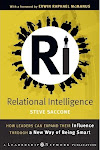When it comes to the impact we long to have, we must be intelligent in how we approach our relationships.
To build and develop true relational influence, we have to be invited into someone’s relational space versus what we sometimes do, which is invade someone’s relational space.
By "relational space," I mean that invisible dynamic inside of people where they either open themselves to someone else’s input or resist it. For instance, if someone refuses to allow us into his "relational space," that means he'll resist any advice, input, or coaching we offer. In leadership, we often don’t pay close enough attention to this interpersonal dynamic, and in the process, we break trust, lose credibility, and diminish our capacity to influence.
Let’s think about this dynamic in a different way. Imagine hiring a personal trainer at a local gym to help you get in shape. By hiring him, you give him permission to coach you, offer his advice, and even push you to exercise with greater effort and focus. You are inviting him into your “space.”
On the contrary, imagine seeing a friend at the mall. After saying hello, he begins assessing your physical health, tells you how much you need to exercise, and then commands you to “get down and do 50 pushups.” I don’t know about you, but I’d be wondering where the hidden camera is.
When put in these terms, this sounds bizarre. But enter the world of relationships, and we often ignore this same principle. We offer advice, input, and coaching to people who have not yet invited us into their relational space. To them, our approach may even seem bizarre because we're trying to impose on them something they've never asked us to give them.
Maybe this happens with a younger person on your team whom you think would benefit from your advice, or with a person you’re trying to mentor but you haven’t established a mentoring relationship, or maybe someone you supervise at work, or as a volunteer, and you assume they want your help. Just because you live in close relational proximity to them, or just because you have a position of authority over them, doesn’t mean you’ve established trust, credibility, nor a voice of influence in their life. That has to be earned.
If we make the wrong assumptions in the relational world of leadership, our relational unintelligence will lead us toward diminishing impact.
Even if our motives are sincere in wanting to make a positive impact on someone, when we force our way into a person’s relational space, they sense our invasion, and will resist. More often than not, they resist because they feel we’re barging in without knocking. They haven’t opened the door and welcomed our input, advice, or coaching. This is their choice. Sometimes we short-circuit the process because we think we have all the right answers for them.
Relationally intelligent leaders refuse to invade people’s space, but instead, wait to be invited into it so their influence expands rather than diminishes. They know this is where true relational influence happens.
Steve Saccone's Reflections on a New Way of Being Smart
Relational Intelligence
Create Movement. Remember to Love.

- Steve Saccone
- Los Angeles, CA, United States
- Steve is a leadership catalyst, writer, and creativity consultant. He works with Mosaic, a spiritual community in Los Angeles who strives to empower creativity of the human spirit, as well as cultivate relational and spiritual health. Steve also works as a Field Advisor for the Gallup Organization, serves as Director of Protege, a 2-year Global Leadership Program, and is an Adjunct Professor and guest lecturer for numerous universities.
Reading That's Worth Your Time
- A Whole New Mind: Why Right Brainers Will Rule the Future
- Drive: The Surprising Truth About What Motivates You
- How to Think Like Da Vinci: Seven Steps to Genius Everyday
- Lynchpin: Are You Indispensable?
- The Journey of Desire: Searching For The Life We've Only Dreamed Of
- Who's Your City? How the Creative Economy Is Making Where to Live the Most Important Decision
